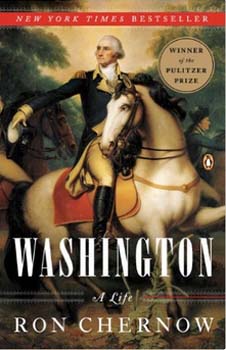
My first book on a Quixotic Quest to read up on all 44 presidents. Since I read David McCullough’s opus on Harry Truman 20 years ago I have two down and 42 to go. I figure William Harrison and James Garfield will be brief given their short times in office.
Despite how funny and exaggerated the cartoon/song above is, Washington’s reputation was almost as legendary during the latter 25 years of his life. It all happened due to his acceptance of being the General of the Continental Army.
Chernow starts off with Washington’s ancestors who left Great Britain to join the Virginia colony. Their common threads? Few of them lived long after 40, they were mostly loyal to the mother country and immersed in the slave-land economy which would dominate the South for generations to come. Then we get to the story of George through key stages: his upbringing, his young adult years (The French & Indian War would be here), the Revolution (the lion’s share of the book, it took me a while to slog through this part), after the War, the Presidency and the last three years of his life.
What did I learn about George that I never knew nor gave much thought about?
- He only traveled abroad once in his life. To the West Indies with his half brother who was ill and thought the islands would rejuvenate his health.
- Unlike the other Founders (with the exception of Franklin), he didn’t have a formal education. His mother Mary thought it was a waste of money and wanted her children close by to help run her farm. Washington probably would be the equivalent of a high-school dropout today.
- I always wondered why none of his descendants are present in American politics (unlike the Bushes or Kennedys); he never had any children with Martha. All the progeny he raised with Martha were from her first marriage.
- I did know he wasn’t a great general when it came to strategy or openly fighting the British-Hessian forces. He was very skilled at intelligence (spying usually) and tricking the enemy about his Army’s whereabouts or numbers.
- His personal finances suffered immensely from the Revolution and being president. He wasn’t exactly a wizard at running Mt. Vernon neither but being away made matters worse.
- Washington may have fought fiercely against the British but Chernow seems to give the impression he resented their military for never commissioning him as a peer. He’s somewhat of an Anglophile until the War.
It’s not a light read at 800 pages on Kindle. Life is probably the most complete take on America’s first president short of taking a college-semester course on him. I think every Libertarian who opens his mouth (they’re mostly male, and White) and spouts off the usual incorrect facts about Washington should read this. Then they’ll take him appropriately off their list of proponents for smaller government. Washington became a proponent of a central government during the Revolution because the Continental Army was always starved for funding. The Continental Congress operated under a beta version of the rather ineffective Articles of Confederation which is why he struggled with frequent mutinies and desertions. Another group of ignoramuses known as the Three Percenters would be horrified to find out that most “patriots” didn’t really fight to liberate the Colonies from the British; the majority were either press-ganged “contractors” (this was frequently the case with the South) or loaned militia units (New Englanders usually) under annual agreements. Washington often had to cajole his Army into sticking around after every New Year’s Day. His legendary “crossing the Delaware” attack on Christmas against the over anxious Hessians (they weren’t drunk) was done in order to utilize his forces before they bolted a week later.
I’m glad I read this. Overall, Washington really was enigmatic and disliked the limelight. Some of this was faux modesty and at other times he wanted to assure the new country, especially the Republican critics, he wasn’t planning to declare himself king or president for life.
Was he a good or bad president? I think he was the happy medium America needed when the Constitution was ratified. Washington didn’t make any major waves like Lincoln or Jackson because his primary goal was to get this new system of government to take root with 13 former, disparate colonies. He succeeded, especially after the Whiskey Rebellion.
Next up…a couple non-prez books and next year, I hope to find a cradle-to-grave account of John Adams, America’s first one-termer.
